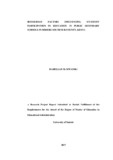| dc.description.abstract | The main purpose of the study was to assess the household factors that influence students’ participation in public secondary school in Mbeere South Sub-County, Kenya. To achieve this, the researcher had four objectives. These objectives included households’ level of income influence on dropout, family attitude influence on dropout, influence of child labour on dropout and lastly the influence of family structure on the http://erepository.uonbi.ac.ke/submissionsstudents’ participation. This research adopted a descriptive survey design. The target population constitutes of all the 30 public secondary schools, 30 principals, 237 teachers and 945 students in the schools. This study consisted of 10 principals, 74 teachers and 212 students. Simple random sampling was used to select a third of the schools to participate in the study which added up to 8 secondary schools. The researcher designed the research instruments. She used questionnaires as research instruments for the principals, deputy principals, teachers, and students. Content validity and test-retest were used to check the validity and reliability of the instrument. Quantitative data from the questionnaire was summarized using descriptive statistics. This was done by ordering the teachers teaching experience, age, gender, academic qualification and school size using ordinal scale by use of mode. Quantitative data was then categorized. The overall average response rate of the total target population was therefore 92.2 percent. The findings showed that parental economic status does influence dropout among students in public secondary schools. The attachment to low household income is compounded by involvement in income generating activities, inability to afford basic needs, looking after young siblings and inability to pay fees. Family attitude influences dropout among students in public secondary school. The specific items that influence dropout rates are lack of role models, poor relationship of students and their parents, lack of understanding on motivating students, lack of academic guidance of students by parents, involvement in home activities that are not academically focused, lack of understanding of educational needs of students and parents having low value for education. Households’ size influences dropout among students in public secondary schools. Households with large size have majority of the dropouts due to; lack of fees, lack of basic needs and lack of educational support. Finally, family structure also influences students’ participation in public secondary school in Mbeere South Sub-County. The study recommended poverty alleviation measures should be strengthened in the society to enable all families get higher income so as to maintain their children in school till completion. Similar study should be undertaken in primary schools in the district in order to compare results | en_US |



